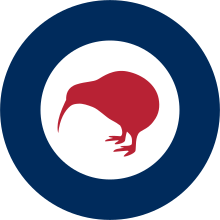Kiwi (nickname): Difference between revisions
m Reverted edits by 217.205.177.82 (talk) to last version by Haruth |
No edit summary |
||
| Line 1: | Line 1: | ||
{{Other uses|Kiwi (disambiguation)}} |
{{Other uses|Kiwi (disambiguation)}} |
||
'''[[Culture of New Zealand#Kiwi|Kiwi]]''' is the nickname used internationally for [[New Zealanders|people from New Zealand]],<ref>[http://glossary.immigration.govt.nz/Kiwis.htm Kiwis/Kiwi - New Zealand Immigration Service (Summary of Terms)]</ref> as well as being a relatively common self-reference. The name derives from the [[kiwi]], a [[flightless bird]], which is native to, and the [[national symbol]] of, New Zealand. The usage is not offensive, being treated with pride and endearment as a uniquely recognisable term for the people of New Zealand. |
'''[[Culture of New Zealand#Kiwi|Kiwi]]''' is the nickname used internationally for [[New Zealanders|people from New Zealand]],<ref>[http://glossary.immigration.govt.nz/Kiwis.htm Kiwis/Kiwi - New Zealand Immigration Service (Summary of Terms)]</ref> as well as being a relatively common self-reference. The name derives from the [[kiwi]], a [[flightless bird]], which is native to, and the [[national symbol]] of, New Zealand. Some also say that it is used as most people in New Zealand resemble Kiwi fruits. The usage is not offensive, being treated with pride and endearment as a uniquely recognisable term for the people of New Zealand. |
||
==History== |
==History== |
||
Revision as of 12:17, 15 December 2011
Kiwi is the nickname used internationally for people from New Zealand,[1] as well as being a relatively common self-reference. The name derives from the kiwi, a flightless bird, which is native to, and the national symbol of, New Zealand. Some also say that it is used as most people in New Zealand resemble Kiwi fruits. The usage is not offensive, being treated with pride and endearment as a uniquely recognisable term for the people of New Zealand.
History

The first New Zealanders to be widely known as Kiwis were the military.[2] The Regimental Signs for all New Zealand regiments feature the kiwi, including those that fought in the Second Boer War, then with the Australian and New Zealand Army Corps in World War I. Much of the interaction between regiments and locals was done under the respective Regimental Sign, and the kiwi came to mean first the men of regiments and then all New Zealanders. Due to the relative isolation of New Zealand, many troops stayed in Europe (particularly at Beacon Hill, near Bulford on the Salisbury Plain, where they carved a chalk kiwi into the hill in 1918)[3] for months or years until transport home could be arranged.
The Oxford English Dictionary gives the first use of the 'Kiwi' to mean 'New Zealander' in 1918, in the New Zealand Expeditionary Force Chronicles. The nickname 'Kiwis' for New Zealand servicemen eventually became common usage in all war theatres.[citation needed]
Following World War II the term was gradually attributed to all New Zealanders and today, throughout the world they are referred to as Kiwis, as well as often referring to themselves that way.
Spelling of the word Kiwi, when used to describe the people, is often capitalised, and takes the plural form Kiwis. The bird's name is spelt with a lower-case k and, being a word of Māori origin, normally stays as kiwi when pluralised. Thus, two Kiwis refers to two people, whereas two kiwi refers to two birds. This linguistic nicety is well exemplified by the BNZ Save the Kiwi Conservation Trust, which uses the slogan "Kiwis saving kiwi".
See also
- Kiwi, flightless bird native to New Zealand
- Kiwiana, items or icons particular to New Zealand
- Kiwifruit, fruit associated with New Zealand, but not native to it, which is also known as the "Chinese Gooseberry"
- Māori, the indigenous Polynesian people of New Zealand
- Pakeha, non-Māori (especially European) New Zealanders
- Aussie, slang for an Australian
